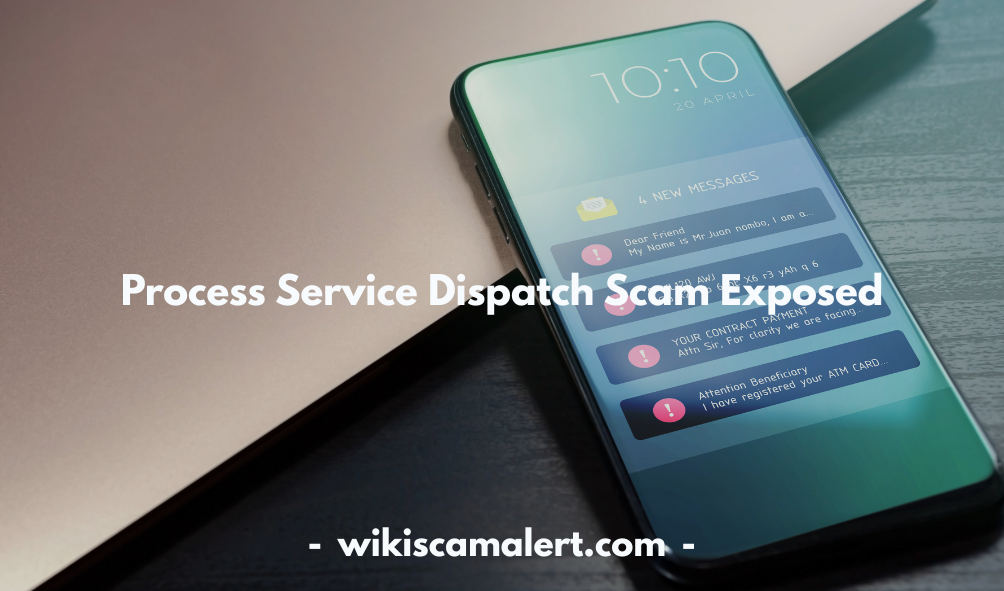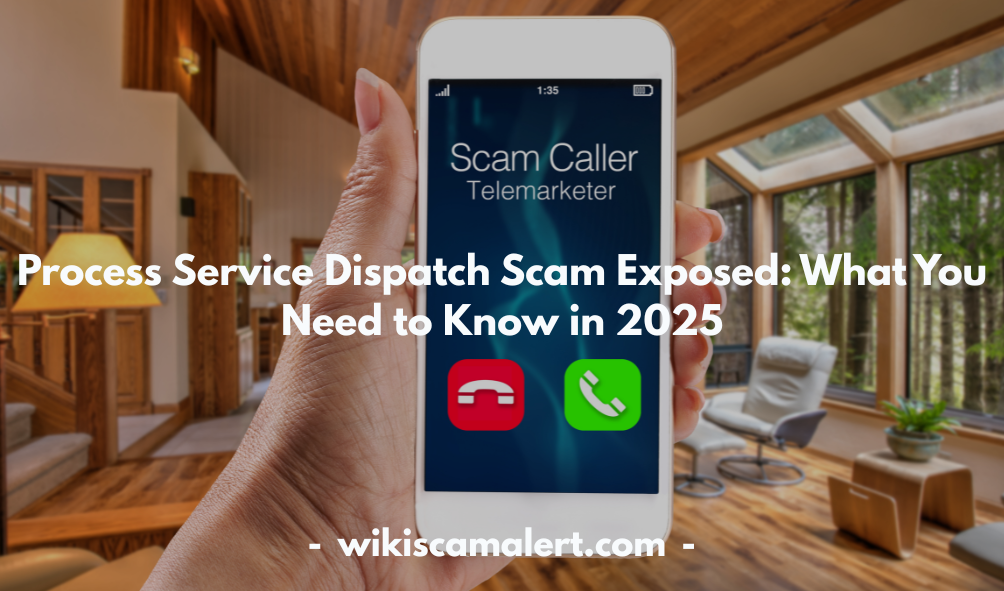In today’s digital age, scams are becoming increasingly sophisticated, and one of the more alarming ones is the process service dispatch scam. These scams prey on individuals by pretending to be legal notices or process servers, creating panic and confusion. Scammers use threats of lawsuits, arrest warrants, or financial penalties to manipulate victims into acting quickly, often leading to the loss of money or sensitive personal information.
This article will dive deep into the mechanics of the process service dispatch scam, providing you with the knowledge you need to recognize red flags and protect yourself. Whether you’ve received a suspicious call or simply want to be prepared, understanding how these scams operate can help you stay one step ahead and avoid becoming a victim.
Understanding the Process Service Dispatch Scam
The process service dispatch scam is a type of fraud that involves scammers posing as legitimate process servers or law enforcement agents. These scammers use a variety of tactics to instill fear and urgency in their targets, usually claiming that legal documents, such as court summons or subpoenas, are being sent. Victims are then tricked into taking immediate action, such as paying fines or providing personal information, which ultimately leads to financial loss or identity theft.
This scam often takes place through phone calls, emails, or letters, with scammers pretending to be from a process service company, law firm, or government agency. They might claim that you have missed an important court date, or that you are about to face legal consequences unless you settle a matter quickly.
Understanding this scam is the first step in protecting yourself. The key is recognizing the warning signs and verifying the legitimacy of any legal notice or communication you receive.
How the Process Service Dispatch Scam Works
Scammers use a variety of methods to carry out the process service dispatch scam. The most common approach involves a phone call or email that seems to come from a law firm or process service agency. The scammer may claim that they need to serve you with legal papers and that they must meet with you immediately. They often create a sense of urgency by claiming that you have missed an important court date or that you are in danger of facing legal penalties if you don’t respond immediately.
Once the scammer has your attention, they typically ask for payment for supposed legal fees, court costs, or service charges related to the “court documents” they are allegedly trying to deliver. They may demand payment through methods such as wire transfers, gift cards, or prepaid debit cards, all of which are untraceable and difficult to recover once sent.
In some cases, the scammer might even threaten to send a “process server” to your home or place of work to deliver the documents, further escalating the stress and urgency. However, this is just a scare tactic. Legitimate process servers follow strict legal protocols and never demand immediate payment.
Common Tactics Used in Process Service Dispatch Scams
The process service dispatch scam relies on a few tried-and-true methods to manipulate victims into compliance. Here are some of the most common tactics:
- Urgency and Threats: Scammers often create a sense of urgency by claiming that immediate action is required, such as paying a fee before a specific deadline to avoid legal consequences. They may also threaten arrest, wage garnishment, or other severe penalties if you don’t comply with their demands.
- Fake Documentation: Some scammers send fraudulent letters or documents that look convincing. These may appear to be official legal notices, often including fake letterheads or logos of government agencies or courts.
- Unverifiable Caller ID: Scammers will use phone numbers that look legitimate, often mimicking the phone numbers of law firms or courts. They may also use “spoofing” to make their number appear as if it’s coming from a government or law enforcement agency.
- Pressure for Payment: A common tactic is to demand payment via untraceable methods, such as gift cards, wire transfers, or prepaid debit cards. This is a clear red flag, as legitimate legal matters do not require these types of payments.
- Manipulation of Emotions: Scammers will often play on emotions, creating fear and anxiety about the legal consequences of ignoring their “demands.” They may claim that your property or bank account is at risk if you do not act immediately.

Red Flags to Look for in a Process Service Dispatch Scam
Recognizing the red flags of a process service dispatch scam is crucial in protecting yourself from falling victim to fraud. Here are some common signs that indicate you might be dealing with a scam:
- Unfamiliar Phone Numbers or Emails: If the call or email comes from an unfamiliar number or a suspicious email address, be cautious. Legitimate legal notices will typically come from recognized agencies or law firms.
- Demand for Immediate Payment: Any demand for urgent payment, especially by untraceable methods such as gift cards or wire transfers, is a major red flag. Legal fees and fines are typically paid through official channels, not via gift cards.
- Threats of Arrest or Legal Action: Scammers often threaten arrest or other legal penalties if you don’t act quickly. This is not how legitimate legal processes work. Process servers do not threaten to arrest individuals over the phone or demand immediate action.
- Vague or Non-Specific Information: If the caller or email sender is vague about the nature of the legal documents or cannot provide specific information, this is another sign of a scam. Legitimate process servers or lawyers will provide clear and specific details about the legal matter at hand.
- Unprofessional Communication: Scammers may use unprofessional language, make spelling or grammar mistakes, or seem overly pushy or aggressive. Legitimate legal notices are typically formal and professional in tone.
How to Spot a Fake Process Service Dispatch Call
Receiving a process service dispatch call can be frightening, especially if you’re unfamiliar with the process of receiving legal documents. Here’s how to spot a fake call:
- Verify the Caller’s Identity: Always ask for the caller’s name, company, and contact details. Legitimate process servers will have no problem providing this information. You can look up the company and contact them directly to verify if they have been assigned to your case.
- Don’t Rush to Make Payments: A legitimate process server will never demand payment during the initial phone call. Payment for court costs or legal fees is handled through proper channels, and you will typically be given notice of such fees in writing.
- Request Written Documentation: If someone calls claiming they are from a legal firm or process service, ask for the documents to be sent to you via mail or email. A legitimate process server will comply. Scammers, on the other hand, will often avoid giving you written proof.
- Don’t Trust Spoofed Numbers: If the caller’s number appears to be coming from a government agency or law office but you’re still suspicious, hang up and call back using a verified number. Scammers may use fake caller ID numbers that look like official government or legal numbers.
- Check for Scare Tactics: A legitimate process server will never use scare tactics, such as threats of arrest or dire legal consequences, to pressure you into acting quickly. Scammers rely on fear to make you act impulsively.
By staying alert to these warning signs and taking the time to verify the legitimacy of any calls or communications, you can avoid becoming a victim of the process service dispatch scam.
What Happens If You Fall for a Process Service Dispatch Scam
Falling for a process service dispatch scam can have several harmful consequences, both financially and personally. The immediate outcome is often a loss of money. Scammers typically demand payment for fake fees, court costs, or other alleged legal services. Once the money is sent, especially through untraceable methods like gift cards or wire transfers, it’s nearly impossible to recover.
In addition to financial losses, falling for this scam may cause emotional distress. Scammers create a sense of urgency and fear, leading victims to panic and make hasty decisions. This may involve providing personal information or even agreeing to settlements under duress.
For some, the consequences go beyond money. Scammers may collect sensitive personal information such as your Social Security number, address, or banking details, which they can later use for identity theft or fraud. This can open the door for even more scams in the future or lead to unauthorized financial transactions. Victims may also become susceptible to other forms of scam attempts once their personal details are compromised.
It’s also important to note that while the scam itself may not carry legal consequences, falling victim can complicate matters if scammers gain access to your personal accounts or use your information to commit fraud. It’s essential to stay vigilant and report any such incident immediately to prevent further harm.
Legal Consequences of Ignoring a Process Service Dispatch Scam
When you receive a process service dispatch scam, ignoring it may seem like the safest approach, especially if you’re unsure whether it’s legitimate. However, doing so could have unintended consequences. While legitimate process servers are bound by strict legal protocols, scammers operate differently and use the fear of legal action to trick individuals into taking unnecessary steps. Ignoring the scam may not lead directly to legal trouble, but it’s crucial to act cautiously in order to protect yourself from further harm.
If you ignore the scammer’s request for money or personal information, the scammer might escalate the situation by threatening arrest or legal action. While these threats are empty, they can still be unsettling. Ignoring such threats can make you feel anxious or paranoid about facing legal repercussions, especially if you’re unsure whether the threat is real.
However, if you do receive a legitimate process service from an official legal entity—such as a court summons or subpoena—it is essential not to ignore it. Unlike a scam, ignoring an official legal document can lead to legal consequences, including default judgments, fines, or even arrest. The key is to differentiate between genuine and fraudulent communications. If you are unsure, always seek legal advice before ignoring any legal correspondence.
The Role of Process Servers in Legal Proceedings
A process server plays an essential role in the legal process by delivering legal documents, such as subpoenas, summonses, and court orders, to individuals involved in a lawsuit. This is a critical step in ensuring that the defendant is formally notified of the legal actions being taken against them. The purpose of a process server is to ensure that all parties in a legal case are properly informed of their rights and responsibilities.
Legitimate process servers are neutral third parties, not involved in the legal case itself, and they are tasked with delivering legal notices. They are often private contractors or employed by law firms and are trained to follow strict protocols. In many cases, process servers are required to provide proof of delivery, usually through a notarized affidavit or proof of service. This documentation verifies that the person being served received the legal papers, which is vital for the legal proceedings to move forward.
Process servers are also bound by local laws and regulations regarding the delivery of documents. For instance, they are not allowed to serve individuals in certain situations, such as if the person is underage or if the service takes place in a manner that violates someone’s rights (e.g., harassing the individual). Understanding the role of process servers can help you distinguish between legitimate legal processes and scams.
How to Verify the Legitimacy of a Process Service Dispatch
Verifying the legitimacy of a process service dispatch is crucial to avoid falling victim to a scam. Here are some key steps to confirm whether the process service is legitimate:
- Request Documentation: A legitimate process server should be able to provide documentation about the legal case. Ask for a copy of the complaint or legal notice being served. If they refuse or seem evasive, this is a red flag.
- Check the Contact Information: Verify the contact information provided in the communication. A legitimate process server or law firm will have official phone numbers, email addresses, and websites. If the communication comes from a generic email address or unverified number, it’s a strong indicator of a scam.
- Verify with the Court or Law Firm: If you’re unsure, call the court or law firm directly to confirm whether they have a pending case involving you. Never rely on the contact information provided in the suspicious communication. Use trusted sources to obtain the correct contact information.
- Look for Red Flags: Legitimate process servers do not demand immediate payment, nor do they threaten you with arrest or other legal action during the service of papers. If the communication includes such demands, it’s almost certainly a scam.
- Cross-Check the Company: Research the company or individual claiming to be the process server. Look for reviews or complaints about the business. If the process server is a legitimate company, there should be easily accessible information about them.
Steps to Take if You Receive a Suspicious Process Service Dispatch Call
If you receive a suspicious process service dispatch call, it’s important to handle the situation cautiously to avoid falling for a scam. Here are the steps you should take:
- Stay Calm and Don’t Panic: Scammers rely on creating a sense of urgency and fear. Take a moment to breathe and assess the situation objectively.
- Ask for Details: Request the name of the process server, the case number, and the law firm or court handling the case. A legitimate process server will have no problem providing this information. If the caller hesitates or is vague, it’s a sign that they may not be legitimate.
- Do Not Provide Personal Information: Never provide sensitive information such as your Social Security number, bank account details, or credit card information during the call. Legitimate process servers will never ask for this kind of information over the phone.
- Verify the Call: Hang up and independently verify the legitimacy of the call. Use official websites and contact numbers to verify the case with the court or law firm involved.
- Document Everything: Take notes during the call, including the phone number, time, and any details mentioned. This documentation will be useful if you need to report the scam to authorities.
- Report the Scam: If you determine that the call is a scam, report it to the authorities. You can file a complaint with the Federal Trade Commission (FTC), your local consumer protection agency, or the Better Business Bureau (BBB).
How to Protect Yourself from Process Service Dispatch Scams
Protecting yourself from process service dispatch scams requires a combination of awareness, skepticism, and knowledge of the signs to watch for. The following steps will help you avoid falling victim to these scams:
- Verify the Legitimacy of the Process Service: As mentioned earlier, always verify the authenticity of the process server or the legal firm claiming to be involved. If they provide vague information or seem unwilling to provide verifiable documentation, that’s a red flag. You can contact the courthouse, law firm, or other involved parties to confirm the legitimacy of the case.
- Never Pay Unsolicited Fees: Legitimate process servers do not demand payment on the spot for their services. If someone calls or emails you asking for payment for a service they’re allegedly providing, this is a strong indication that it’s a scam. Always ask for detailed written proof of the charges before making any payment.
- Keep Your Personal Information Secure: Scammers often prey on individuals’ fear and urgency, asking for personal information like social security numbers or bank account details. Always be cautious when sharing such sensitive information over the phone, especially if you didn’t initiate the conversation.
- Be Cautious with Unsolicited Contact: Legitimate legal processes involve formal, documented communications. If you receive an unsolicited call or email about a legal case, take your time to research and verify the claim. Be wary of messages that don’t include clear, verifiable details, or that push you to act immediately.
- Use Technology for Protection: Install call-blocking apps or services to help filter out unsolicited or suspicious calls. You can also check phone numbers that claim to be from a process server or law firm online to see if others have reported them as scams.
- Educate Yourself and Others: The best way to stay protected is to stay informed. Familiarize yourself with common tactics used by scammers in process service dispatch scams, and share this information with family and friends to help them avoid falling prey to similar schemes.
By following these steps, you can significantly reduce your chances of falling victim to a process service dispatch scam.
Commonly Reported Process Service Dispatch Scam Scenarios
Process service dispatch scams typically follow a few common patterns. These scams often rely on creating a sense of urgency and threatening legal consequences to manipulate victims. Here are some of the most commonly reported scam scenarios:
- Fake Threats of Legal Action: Scammers often call or send emails claiming that the victim is being sued and must pay a fee for a process service. They might threaten the victim with an arrest or legal consequences if the payment is not made immediately. These threats are entirely false, as legitimate process servers will never demand instant payments.
- False Requests for Personal Information: Some scams involve a process service dispatch that requests personal information to “confirm” your identity or your involvement in a case. They may ask for social security numbers, bank account details, or credit card information, claiming these are needed to finalize the process service.
- Untraceable Payment Demands: One of the hallmarks of process service dispatch scams is the demand for payments through untraceable methods, such as gift cards, wire transfers, or cryptocurrency. This is a common scam tactic, as these payment methods are difficult to trace, making it easy for scammers to steal funds without facing consequences.
- Claims of Missed Court Dates: Scammers will often tell victims that they missed an important court date and are now being served with legal papers. They will demand payment to prevent further legal action, often pushing the victim into a state of panic to get them to pay quickly.
- Requests to Meet in Person: In some cases, scammers may attempt to arrange an in-person meeting to “serve” legal documents. They might insist on meeting at a particular location or at an inconvenient time. These meetings are often a ploy to intimidate victims or further pressure them into making payments.
By knowing these common scenarios, you can better identify suspicious situations and avoid falling for process service dispatch scams.
Why Scammers Use the Process Service Dispatch Approach
Scammers frequently use the process service dispatch approach because it leverages several psychological and emotional triggers that make it easier to manipulate victims. Here’s why this tactic works so effectively:
- Fear of Legal Consequences: The threat of legal action, arrest, or financial ruin is a powerful motivator. Scammers prey on the natural fear people have of legal troubles, causing them to act quickly and without thinking. By creating a false sense of urgency, scammers hope to rush the victim into complying without taking the time to verify the legitimacy of the claim.
- The Legitimacy of Legal Documents: Many people assume that a process server is a legitimate, official figure. Because the role of process servers is recognized in the legal system, scammers exploit this trust, using the term “process service” to make their calls or emails appear more credible.
- Complicated Legal Processes: Legal matters can be confusing, and many people do not fully understand the role of a process server. Scammers take advantage of this confusion, knowing that most victims won’t question an alleged legal process, even when it’s not legitimate.
- High Pressure Tactics: The scammers often apply high-pressure tactics, such as demanding immediate payment or threatening to involve the police or a court in the situation. This pressure prevents victims from taking a step back and analyzing the situation critically.
By understanding the psychology behind these scams, you can better defend yourself and avoid falling victim to process service dispatch scams.
How Scammers Manipulate Fear in Process Service Dispatch Scams
Fear is the central tool that scammers use to manipulate victims in process service dispatch scams. Here’s how fear is typically used in these scams:
- Threat of Arrest: A common tactic is the threat of arrest or detention if the victim does not comply with the scammer’s demands. Scammers will often claim that failure to respond to the process service or pay the required fees will result in a criminal warrant for arrest. This plays into the victim’s fear of legal trouble, even though it’s an empty threat.
- Sense of Urgency: Scammers often create a sense of urgency by claiming that the victim must act immediately or face severe consequences, such as missed court dates or default judgments. This urgency heightens the victim’s fear, causing them to make hasty decisions without considering the situation carefully.
- Emotional Manipulation: Some scammers use emotional manipulation to convince victims that they are at fault or that they’ve made a mistake. They might claim that the victim is responsible for missing a court date, failed to make payments, or otherwise neglected an important legal matter. This creates feelings of guilt and fear of future repercussions.
- Fake Legal Documents: To make the threat seem more legitimate, scammers sometimes send fake legal documents or appear in official uniforms. This tactic aims to make the victim believe that the threat is genuine, amplifying the fear of legal consequences.
By recognizing how scammers manipulate fear, you can avoid being controlled by these emotions and make more rational decisions in the face of a process service dispatch scam.
The Impact of Process Service Dispatch Scams on Victims
Victims of process service dispatch scams can experience a wide range of negative effects, both immediate and long-term. These impacts can be financial, emotional, and legal, and they can vary depending on the extent to which the victim falls for the scam.
- Financial Loss: One of the most immediate effects of falling for a scam is financial loss. Victims are often tricked into paying fees that do not exist or agreeing to pay for non-existent legal services. Once the payment is made, especially through untraceable means, it is nearly impossible to recover the funds.
- Emotional Distress: The emotional toll of being targeted by a scam can be significant. Victims may experience stress, anxiety, and fear, especially if they are threatened with legal action. This emotional distress can linger even after the scam is exposed, as it can affect a person’s trust in legitimate legal processes.
- Identity Theft: If scammers obtain personal information during the process service scam, they may use it for identity theft. This could involve opening credit accounts in the victim’s name or making fraudulent purchases, leaving the victim with a long-term financial and emotional burden.
- Damage to Reputation: In some cases, victims of scams may feel ashamed or embarrassed about falling for the scheme, particularly if they shared personal details with the scammer. This damage to self-esteem can deter victims from reporting the scam or seeking help.
- Legal Complications: If the scam involves a fraudulent claim of a missed court date or legal obligation, the victim may feel uncertain about whether they’ve inadvertently violated the law. This uncertainty can lead to further complications, including unnecessary legal consultations or actions that were not needed.
What to Do If You Receive a Process Service Dispatch Scam Letter
Receiving a process service dispatch scam letter can be a stressful experience, but knowing how to handle it can prevent further complications. Here’s what to do if you find yourself in this situation:
- Don’t Panic: Scammers rely on creating a sense of panic and urgency to get their victims to act without thinking. If you receive a suspicious letter, take a deep breath and give yourself time to assess the situation rationally.
- Look for Red Flags: Examine the letter for any signs of a scam. Common red flags include:
- Unprofessional Formatting: Scammers often send poorly formatted documents with spelling and grammatical errors.
- No Official Contact Information: Legitimate process service companies will provide detailed contact information, including a physical address and phone number. If the letter lacks these details, it could be a scam.
- Pressure to Act Quickly: If the letter insists you need to pay or respond immediately to avoid legal action, it’s likely a scam. Legitimate legal proceedings do not work in this way.
- Unprofessional Formatting: Scammers often send poorly formatted documents with spelling and grammatical errors.
- Verify the Claim: Contact the legal firm or court listed in the letter. Use official contact information from a trustworthy source, such as the court’s website, to ensure that they are involved in the process. If the letter claims a missed court date, check with the court to confirm if there are any such records associated with your name.
- Consult with a Lawyer: If you are unsure whether the letter is a scam or not, it’s a good idea to seek legal advice. A lawyer can help you navigate the situation and determine if any legal action is genuinely required. They can also guide you on how to deal with the scammers.
- Ignore the Request for Payment: Most process service scams involve some sort of financial demand, often for fake fees or services. Do not send any money or personal information. Legitimate process servers will never demand immediate payment over the phone or via email.
- Document Everything: Keep a copy of the scam letter for your records. Document any phone calls, emails, or interactions you have with the scammer. This can be helpful if you need to report the scam to authorities.
By staying calm, verifying the information, and seeking legal counsel if necessary, you can avoid falling for a process service dispatch scam and protect yourself from further complications.
How to Report a Process Service Dispatch Scam
If you believe you have encountered a process service dispatch scam, reporting it to the appropriate authorities is crucial. Reporting the scam not only helps you protect yourself but also prevents others from falling victim to similar schemes. Here’s how to report a process service dispatch scam:
- File a Complaint with the Federal Trade Commission (FTC): The FTC is the U.S. government agency that handles consumer complaints related to fraud and scams. You can file a complaint online through their website, providing details about the scam, including how you were contacted and any financial losses you experienced. The FTC can use this information to investigate the scam and take action.
- Contact Your Local Consumer Protection Agency: Many states have consumer protection agencies that handle fraud and scam-related issues. These agencies can provide guidance on how to proceed and may investigate scams that affect consumers in their jurisdiction. You can find the contact information for your state’s consumer protection office through your state government’s website.
- Report to the Better Business Bureau (BBB): If the scam involves a company or a fake law firm, you can file a complaint with the Better Business Bureau. The BBB helps consumers by providing a platform to report scams and reviews businesses to see if they have any complaints against them.
- Inform the Local Authorities: If you’ve received a process service dispatch scam letter or phone call and feel threatened or intimidated, consider reporting it to your local law enforcement. Scammers often use fraudulent documents and threatening language, and local authorities can help by investigating the situation and possibly identifying the perpetrators.
- Alert the Court System: If the scam involves a fake process service or claims to involve a court case, you should notify the court system. They may be able to verify if any legitimate legal cases are pending against you or if a fake process server is being used to target individuals.
- Warn Others: Share your experience on social media or consumer forums to warn others about the process service dispatch scam. This helps raise awareness and may encourage others to report similar incidents.
By reporting the scam, you not only protect yourself but also help authorities track down and stop these fraudulent activities.
The Importance of Law Enforcement in Combatting Process Service Dispatch Scams
Law enforcement plays a critical role in combatting process service dispatch scams. These scams can have serious financial and emotional consequences for victims, and effective intervention is necessary to deter scammers and prevent future crimes. Here’s why law enforcement involvement is so crucial:
- Investigating and Identifying Scammers: Law enforcement agencies are equipped with the resources and legal tools needed to investigate and identify scammers. By working with local, state, and federal agencies, authorities can track down scam operations and bring criminals to justice.
- Preventing Further Victimization: Scammers often target vulnerable individuals who may not know how to protect themselves. Law enforcement intervention helps stop scammers from continuing their fraudulent activities, preventing more people from being taken advantage of.
- Increasing Public Awareness: Law enforcement agencies can help raise awareness of process service dispatch scams by issuing public warnings and educational materials. This helps individuals recognize the signs of a scam before they fall victim.
- Enforcing Legal Consequences: By taking legal action against scammers, law enforcement can deter others from engaging in similar schemes. Effective enforcement of fraud laws holds criminals accountable and discourages further scams.
- Collaborating with Other Agencies: Many process service dispatch scams cross state and even international borders. Law enforcement agencies collaborate with other organizations, such as the Federal Trade Commission (FTC) and the Internet Crime Complaint Center (IC3), to address scams that span multiple jurisdictions.
By actively involving law enforcement, society can help reduce the prevalence of scams and protect innocent people from falling victim to fraudulent activities.
How to Educate Others About Process Service Dispatch Scams
Educating others about process service dispatch scams is essential for raising awareness and preventing future victimization. Here are some effective ways to share information and educate your community:
- Share Your Experience: Personal stories can be powerful tools for educating others. If you’ve been targeted by a process service dispatch scam, share your experience with friends, family, and colleagues. This helps raise awareness about how these scams work and how to recognize them.
- Utilize Social Media: Use your social media platforms to spread the word about process service dispatch scams. Posting informational articles, sharing scam alerts, and providing tips on how to recognize scams can help reach a large audience quickly.
- Distribute Educational Materials: Create or distribute flyers or brochures about process service dispatch scams. Include information on how to identify these scams, steps to take if targeted, and contact details for reporting them. These materials can be shared in community centers, schools, libraries, or local businesses.
- Host Workshops or Presentations: Offer to host a workshop or informational session at local community centers, senior centers, or libraries. Educating people in person can have a big impact, especially if they are not familiar with the red flags of scams.
- Partner with Local Organizations: Work with local consumer protection groups, law enforcement, and legal professionals to host community education events. Collaborating with experts can lend credibility to your efforts and help ensure that the information shared is accurate and effective.
- Encourage Reporting: Remind others to report any scams they encounter to local authorities and consumer protection agencies. The more information authorities have, the better equipped they are to stop these fraudsters.
By educating those around you, you help create a more informed and vigilant community that is better equipped to protect itself from process service dispatch scams.
What Legal Experts Say About Process Service Dispatch Scams
Legal experts play a vital role in helping the public understand the nature of process service dispatch scams and how to protect themselves. Here’s what some legal professionals have to say about these types of scams:
- Scams Rely on Ignorance: According to legal experts, scammers often take advantage of the public’s lack of knowledge about process serving and legal proceedings. Many people are unaware that legitimate process servers do not demand immediate payment or communicate in the ways scammers do. Legal experts emphasize the importance of educating the public to reduce the effectiveness of these scams.
- Legal Documents Are Formal and Traceable: Lawyers point out that legitimate legal documents are usually delivered through formal means and are traceable. A legitimate process server will often require you to sign for the documents or receive them in person at an official address. If you receive a legal document without any of these formalities, it’s likely a scam.
- Victims Have Legal Recourse: Legal professionals urge victims to report process service dispatch scams to law enforcement and consumer protection agencies. They emphasize that victims should not ignore scam letters or calls, as failing to act may worsen the situation. Legal recourse may include the possibility of pursuing a case for fraud against the scammer if their identity can be traced.
- Scammers Violate Legal Ethics: Lawyers also note that scams like these violate the ethical and professional standards of legal practice. Legitimate legal professionals do not use deceptive tactics to pressure people into making payments. Scam victims should be aware that this behavior is not only illegal but also unethical.
- It’s Critical to Stay Calm and Seek Professional Help: Legal experts advise people to stay calm and seek professional help when dealing with process service dispatch scams. Consulting with a lawyer can help clarify the situation and ensure the scam is dealt with appropriately.
How the Process Service Dispatch Scam Works
Step-by-Step Breakdown of the Scam Tactics
- The Initial Call: The victim receives a call from someone claiming to be a process server or associated with a legal entity.
- Threats and Urgency: The caller creates urgency, warning the victim that they are about to be sued or arrested if they don’t act immediately.
- Request for Payment or Personal Info: Often, scammers demand payment for a supposed fine or request sensitive personal information to “resolve the matter.”
- False Legal Documents: In some cases, scammers may follow up with emails or fake documents, making the threat appear more legitimate.
Why These Calls Sound Convincing
What makes this scam so dangerous is how convincing these callers can be. They often use professional-sounding language, reference legal jargon, and may even provide details about the victim that make it seem like the call is real. The combination of fear and urgency creates a perfect storm for manipulation.
Why This Scam Is So Effective
Fear of Legal Trouble
The reason this scam works so well is simple: fear. When people hear threats of legal action, they often panic and make rash decisions. Scammers exploit this fear to manipulate victims into providing money or sensitive information.
Urgency and Confusion
The scammers also create a sense of urgency, making the victim feel like they need to act quickly or suffer serious consequences. The confusion surrounding legal terms and processes also adds to the victim’s sense of urgency.
Legal vs. Scam: How to Tell the Difference
What a Legitimate Process Server Will Do
A legitimate process server will never threaten you over the phone. They will make arrangements for delivering legal documents in person, and they may follow up with official documentation. Furthermore, they will never demand money immediately. If you’re unsure about the authenticity of a process server, you can verify their credentials through the court system.
How Courts Actually Notify People
Courts typically don’t use phone calls for legal notifications. Instead, they rely on official legal notices served in person or mailed to the individual involved. If you receive a phone call claiming to be from a court or legal entity, be cautious.
What to Do If You Receive a Suspicious Call
Questions You Should Ask
If you’re unsure whether a call is a scam, ask the caller for specific details. A legitimate process server will provide their name, company, and case number. They should also be willing to send
Who You Can Contact for Help
If you suspect you’ve been contacted by a scammer, contact the local authorities or the court system where the supposed case is being filed. Additionally, you can report the call to consumer protection agencies like the FTC (Federal Trade Commission).
How to Protect Yourself from Process Service Dispatch Scams
Blocking Numbers and Reporting
If you receive suspicious calls, block the number and report it to relevant authorities. Many robocall blocking apps can help screen these calls, but it’s still important to stay vigilant.
Monitoring Credit and Personal Info
If you’ve provided personal information or made a payment in response to a scam, consider monitoring your credit and other accounts for signs of fraud.
Conclusion
The process service dispatch scam is a growing concern, but with the right knowledge and vigilance, you can protect yourself from falling prey to these deceitful tactics. Remember that legitimate process servers follow specific protocols, and they will never demand payment or threaten arrest over the phone. Always be skeptical of unsolicited calls, and take the time to verify the legitimacy of any legal notice.
By staying informed and knowing the signs of a scam, you can confidently navigate these situations without fear or confusion. If you ever find yourself in doubt, don’t hesitate to seek legal advice or report suspicious activity to the proper authorities. Prevention is key, and with the steps outlined in this article, you’re well-equipped to avoid the pitfalls of the process service dispatch scam.
FAQs
What should I do if I gave them information?
If you’ve already shared personal details with a scammer, contact your bank immediately to prevent fraud. Also, monitor your accounts for suspicious activity.
Can the police arrest me over a scam call?
No, a legitimate process server or legal entity will never threaten you with arrest over the phone. Arrests follow strict legal processes.
Are there real legal notices by phone?
No, legal notices are never delivered solely over the phone. If a process server contacts you, they will arrange a formal, in-person delivery of documents.
How do I tell if it’s a scam or real?
Legitimate process servers will always provide specific information and documentation. Scammers, on the other hand, use high-pressure tactics and threats.
Can I sue scammers or report them effectively?
Yes, you can report scammers to the FTC and local authorities. While suing may not always be an option, reporting helps protect others.










